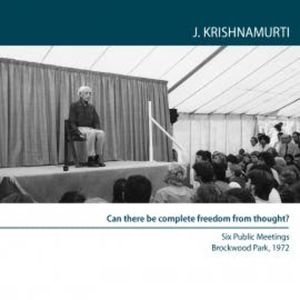Public Talks
1. Complete freedom from thought - 9 September 1972
Duration: 76 minutes
• Learning is instant perception and action. What place has thought in learning?
• To learn about freedom must thought be completely silent? Does insight into
freedom take time?
• Can thinking, however rational, bring about a psychological revolution in us?
• Is thought always conditioned? Is freedom the non-existence of thought?
• My very being is related to thought. If you want to see something new, what do
you do?
• To have insight, let go of the old and listen.
• Learning is not memorizing.
• Q: Is feeling another way of thinking?
• Q: Isn't the need to love and be loved essential?
• Needing love is love of self
2. If I don't change now what will the future be? - 10 September 1972
Duration: 86 minutes
• Is thought responsible for fragmentation?
• Does fragmentation have its own activity?
• What is the energy that perceives the total and doesn't live in fragmentation?
• Does comparison bring about fear and pleasure?
• Is thought seeking security in belief and dogma?
• Can the mind learn instantly all the content of the unconscious in which there
are deep, secret fears?
• Does analysis imply time and division? Is consciousness separate from its
content?
• To get at the root of fear means learning about not being.
• Q: What about guilt?
3. If freedom is responsibility, how do I act? - 16 September 1972
Duration: 78 minutes
• Q: What is the action that will be a total response to the world around us?
• Can one respond totally without learning about love and death in relation to
daily life?
• Do we live, or do we tolerate living?
• Do we live according to ideas and conclusions based on belief, dogma and
memory?
• Is there an action which dissipates all images?
• Is love relationship in which there is no image? Is disorder relationship in which
there is the image?
• Can a mind seeking comfort learn about death?
• Find out whether death is something to be avoided or to be lived with naturally.
• Can the mind free itself from the known?
• Q: What relationship has literature, beauty and art to our daily life?
• Q: Were you conditioned by the Masters?
• Q: Can one help someone in distress?
4. To come upon the new, thought must be quiet - 17 September 1972
Duration: 66 minutes
• If one is serious, one must learn for oneself if there is such a thing as the im
measurable.
• Thought cannot find the immeasurable because thought is measurement and
time.
• Can thought, realizing its limitations, be quiet?
• Can the mind without effort see its content clearly, and the limitation, lack of
space and time-binding quality of its consciousness?
• When you say, 'I do not know,' does the content have importance?
• There are various systems of meditation, gadgets, yoga, to make the mind
quiet. These are unimportant.
• Is truth the very perception of the false?
• When the mind has perceived the truth of something, what is time?
• Is there a different dimension which thought cannot touch?
Public Discussion
5. You can learn only if you do not know - 12 September 1972
Duration: 90 minutes
• Q: Does learning require thinking, or only awareness?
• To be aware is to be conscious, to be in relationship with what you observe
outwardly and also our inward reactions.
• Awareness reveals that I have a conclusion from which I act, which prevents the
free flow of energy.
• You see that you have many opinions and conclusions. You don't know why
you have them or how to be free of them. Start with not knowing.
• Knowledge is in the past whilst learning is vital, in the present.
• In learning, which is a constant movement, can opinion and conclusion ever be
formed?
• Can thought be slowed down naturally? In learning about the function of
thought, slowing down takes place without control or effort.
